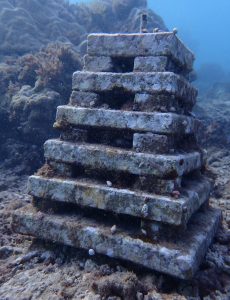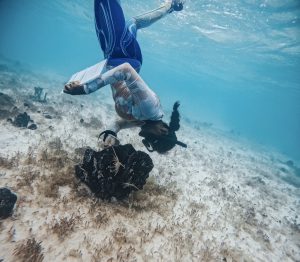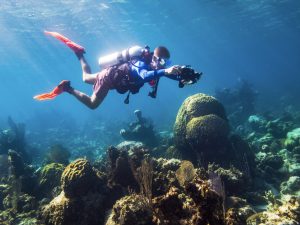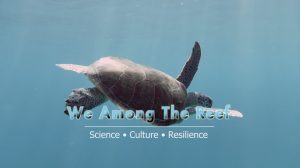PRESS RELEASEMay 21, 2020 Media Contact:Stanton Charlton Perry Institute for Marine Science scharlton@perryinstitute.org
NEW RESEARCH INDICATES ABACO REEF SUCCESSFULLY ADAPTS TO WARMING OCEAN WATERS
New Published Study Will Aid in Coral Reef Conservation Efforts
New research published today in Coral Reefs documents a shallow-water coral reef in Great Abaco, The Bahamas that can tolerate extreme warming ocean temperatures. During a research expedition led by the Perry Institute of Marine Science, scientists from the Shedd Aquarium in Chicago, SECORE International, the University of South Florida and Middlebury College examined a coral reef off Abaco that was able to thrive in conditions in which other coral reefs struggle to survive. The study uncovered genetic differences between two adjacent reefs, both dominated by mountainous star coral (Orbicella faveolata), which may have allowed certain corals to survive through a coral bleaching event in 2015. Their results may help inform strategies to protect and restore coral reefs in the face of rising sea temperatures from climate change.For The Bahamas, which has more coral reef area than any other nation in the region, conserving coral reefs is vital to the country’s economy, culture and livelihoods.“Coral reefs are part of the fabric of The Bahamas, harboring important fishery resources that feed the nation and are vital to the economy, and protect the coastal zone where homes and tourism is concentrated,” said Craig Dahlgren, Ph.D., Executive Director of the Perry Institute for Marine Science. “As our oceans warm from climate change, we must continue to study invaluable and fragile corals to help them persist. This new research is an essential piece of the coral conservation puzzle.”Previous research describes climate change as the primary driver of coral reef declines across the globe. Increased sea temperatures of even about 1 degree Celsius (less than 2 degrees Fahrenheit) above usual conditions can induce coral bleaching—the collapse of a vital symbiosis between corals and microalgae, during which stressed corals expel the beneficial algae. Bleaching can result in coral death and broader ecosystem degradation. For example, coral cover has decreased by over 80% on Caribbean reefs since 1970.“We know that warmer sea temperatures associated with climate change are dramatically impacting reefs globally, so with our research partners, we are working hard and working quickly to determine which corals could survive,” said Ross Cunning, Ph.D., Research Biologist at Shedd Aquarium. “Identifying thermally tolerant reefs like the one in Great Abaco in The Bahamas is a high research priority for coral scientists and will help us determine where we should focus our conservation and reef restoration efforts.”Adaptive genes and helpful microorganisms, such as the microalgae and bacteria that live in the corals’ tissues, are known to influence corals’ tolerance to heat. Four groups of algae from the family Symbiodiniaceae, which commonly live within Caribbean corals, are known to provide varying levels of thermal tolerance to the corals they live with. However, knowledge gaps persist.“There’s a lot that we don’t know about how genetics, symbiotic microorganisms, and environmental factors work together to influence coral bleaching,” said Katie Parker, Research Assistant at Shedd Aquarium. “We set out for answers that will help us understand how some corals might survive extreme temperatures, while others cannot, even though they’re the same species.”To investigate, PIMS researchers and partners looked to corals that are thriving in an extreme, marginal environment. Mermaid Reef in Great Abaco, The Bahamas experienced warming up to 33 degrees Celsius (91.4 degrees Fahrenheit) in 2015, beyond the temperature expected to cause bleaching. However, at this location, mountainous star corals did not bleach. Yet, extensive bleaching of this same species of corals was observed at Sandy Cay Reef (about 18 kilometers or 11 miles south of Mermaid Reef) despite maximum temperatures of only 32 degrees Celsius (89.6 degrees Fahrenheit).Comparing data from both locations, the researchers discovered that heat-tolerant mountainous star corals at Mermaid Reef were genetically identical, and exclusively hosted one algae group (Durusdinium), which are known to increase thermal tolerance by about 1 to 1.5 degrees Celsius. A more diverse bacterial community was found in the tissues of these corals, which may provide the corals with additional defense to heat and other stressors. Meanwhile, the mountainous star corals that bleached at Sandy Cay Reef were more genetically diverse, and they hosted a variety of algal symbiont communities.“The corals we studied in Mermaid Reef were presumably better suited to handle warmer water temperatures because this shallow, inshore reef regularly experiences high temperature and high light conditions, which may have selected for the hardiest corals and symbiotic algae,” said Parker. “Further study of reefs like these may help us better understand how corals acclimate and adapt to ongoing climate change.”The study suggests that certain coral communities with adaptive genetic and microbial defenses to heat-stress may survive and even thrive as sea temperatures rise.“We are hopeful that through selective breeding and propagation, heat-tolerant corals like the ones at Mermaid Reef may help optimize conservation and restoration efforts for reefs at risk,” said Cunning. “But these interventions can only buy a little more time; we have to stop ocean warming in order to ensure a future with healthy coral reefs.”
About the Perry Institute for Marine Science
The Perry Institute for Marine Science is a program-based institution conducting research throughout The Bahamas and other parts of the Caribbean in partnership with governments, international NGOs and local organizations throughout the region. Perry Institute for Marine Science supports a wide range of research that is helping protect our oceans. Our research programs are designed to help us address conservation and management priorities for each focus area.

Unveiling Coral Reef Biodiversity: Insights from ARMS Monitoring Structures
An ARM teeming with new coral recruits and a diversity of marine life, highlighting reef recovery and biodiversity Understanding Coral Reef Biodiversity Most new PhDs

7 Essential Insights from COP16: Tackling Coral Reef Conservation Challenges Amid Climate Change
United #ForCoral: Experts, advocates, and leaders from across the globe join forces at COP16 for the #ForCoral conference, hosted by the International Coral Reef Initiative.

Fieldwork Wrap-Up: Strengthening MPA Management in The Bahamas
Marine protected areas (MPAs) are critical tools in the conservation of marine species and habitats, safeguarding reefs, seagrasses, and mangroves that provide vital ecosystem services

Coral Reef Monitoring with Photogrammetry: A New Era in Reef Health Assessment
Coral reefs are some of the most biodiverse ecosystems on the planet, providing crucial habitat for marine life and protecting coastal regions from erosion. Yet,

Watch “We Among the Reef:” A Documentary on the Abaco Barrier Reef
The Perry Institute for Marine Science invites you to watch “We Among the Reef,” a compelling documentary that illuminates the significance of the Abaco Barrier

Guardians of the Deep: With Training from PIMS, Key Government Staff Become PADI Certified Divers
Akehia Thompson (DMR), Quetta Gibson (DMR), and Gilles Deal (DEPP) share a moment of camaraderie in their scuba gear, embarking on their training journey with



